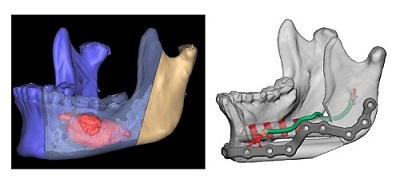OMS Oncology
Oral & Maxillofacial Oncology and Microvascular Reconstructive Surgery
Cancer is a major public health problem worldwide and is the second leading cause of death in the United States. More than 38,000 new cases of oral cavity and pharynx cancers are estimated to occur each year. These cases result in 11,000 deaths annually. The most common etiologic factors in cancers of the oral cavity involve chronic alcohol and tobacco abuse, although these cancers may arise in any persons. Certain subtypes of human papilloma virus (HPV) have been implicated as a risk factor for certain cancers of the oropharynx, the region behind the oral cavity.
The extent or stage of cancer at the time of diagnosis is a key factor that defines prognosis and is a critical element in determining appropriate treatment. The most clinically useful staging system is the tumor node metastasis (TNM) system maintained collaboratively by the American Joint Committee on Cancer (AJCC) and the International Union for Cancer Control (UICC). The TNM system classifies cancers by the size and extent of the primary tumor (T), involvement of regional lymph node (N), and the presence or absence of distant metastases (M).
Treating oral-head and neck cancer patients is extremely complex. Treatment is determined by the specific site and extent of disease, as well as clinical, radiologic, and pathologic findings. In most cases, early stage disease (stage I and II) can be treated with either surgery or radiation alone. Advanced disease (stage III and IV) typically requires combined treatment of surgery, radiation, and occasionally chemotherapy. Smoking and alcohol cessation are encouraged as these habits may reduce treatment efficacy.
A patient diagnosed with oral cancer is often presented at our multi-disciplinary Head and Neck tumor board conference where surgeons, radiation oncologists, medical oncologists, radiologists and pathologists discuss treatment strategies for each patient individually.

We offer comprehensive, individualized care for patients with benign or malignant tumors of the oral and maxillofacial region. Our team specializes in surgical removal of tumors and reconstruction utilizing 3D virtual computer planning techniques with bone grafts, regional flaps, and microvascular free flaps.
Additionally our team has a commitment with the education and prevention for other health providers in local and regional meetings, and we participate annually in the UMMC Dental Mission Week with free oral cancer screenings and prevention activities for the underserved in Mississippi.
A few of the highlights of our practice:
- Oral cancer surgery and removal of lymph nodes (neck dissection)
- Benign odontogenic cysts and tumors
- Treatment of medication-related osteonecrosis of the jaws (MRONJ)
- Complications after head and neck radiation (osteoradionecrosis of the jaws)
- Computer planning for reconstructive surgery
- Local and regional flap reconstruction
- Microvascular reconstructive surgery (vascularized flaps for more complex defects)
- Dental reconstruction after tumor surgery, including dental implants
- Maxillofacial prosthetics and maxillary obturators for oro-facial defects
- Trigeminal nerve reconstruction (microneurosurgery repair with nerve grafts)


